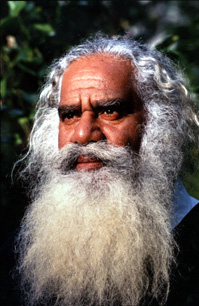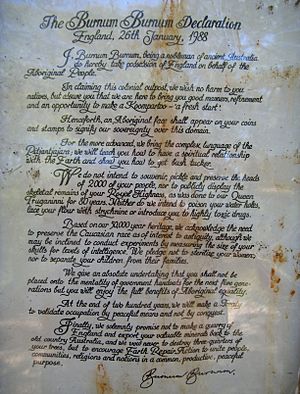Burnum Burnum facts for kids
Quick facts for kids
Burnum Burnum
|
|
|---|---|
 |
|
| Born | 10 January 1936 Wallaga Lake, New South Wales, Australia
|
| Died | 17 August 1997 (aged 61) Woronora, New South Wales, Australia
|
| Other names | Harry Penrith (rejected name from christening) |
| Occupation | Activist, actor, author |
Burnum Burnum (born Harry Penrith, 10 January 1936 – 17 August 1997) was an important Aboriginal Australian person. He was a sportsman, an activist for Aboriginal rights, an actor, and an author. He belonged to the Woiworrung and Yorta Yorta peoples. He was born near Wallaga Lake in southern New South Wales, Australia. In 1976, he changed his name from Harry Penrith to Burnum Burnum. This new name means "Great Warrior" and honored his grandfather and his Aboriginal heritage.
Contents
Early Life and Identity
Burnum Burnum was part of the Stolen Generations. This was a sad time in Australian history when many Aboriginal children were taken from their families. Burnum Burnum was taken when he was only three months old. He grew up in children's homes run by the NSW Aborigines Welfare Board. One of these homes was Kinchela Boys Home at Kempsey. He faced difficult times there, including harsh punishments.
He was taught to think of himself as white and that Aboriginal culture was not good. The Welfare Board even wrote about his achievements in sports like rugby league and surf lifesaving in their magazine, Dawn. They said he was one of the first Aboriginal people to work for the NSW Public Service.
However, many people from the Stolen Generations, even if they were raised in a "white" way, often felt like they didn't belong anywhere. In the 1960s, Burnum Burnum began to search for his true Aboriginal identity. He then joined the fight for Aboriginal rights.
A Talented Sportsman
Burnum Burnum was a skilled athlete. He played first-grade Rugby Union for Parramatta, New South Wales. He also played both rugby league and cricket.
Activism for Rights
Burnum Burnum became involved in Aboriginal rights activism while studying at the University of Tasmania in the late 1960s. He later became a member of the Bahá’í Faith, which he said helped him feel loved and supported.
One of his important campaigns was to have the skeleton of Truganini returned to her people. Truganini was the last full-blooded Aboriginal person of Tasmania. Her skeleton had been displayed in a museum for many years. Thanks to Burnum Burnum's efforts, it was finally released and cremated in 1976.
In 1975, he received a Churchill Fellowship. This allowed him to travel and study other Indigenous peoples around the world.
The Burnum Burnum Declaration
Burnum Burnum is perhaps most famous for an event that happened on Australian Bicentenary Day, 26 January 1988. On this day, he planted the Aboriginal flag on the white cliffs of Dover in England. This was a symbolic act. It was his way of "claiming" England, just as Arthur Phillip had claimed Aboriginal land in Australia in 1788 when the First Fleet arrived. Burnum Burnum joked that he wouldn't harm England's native people, unlike what happened in Australia.
A copy of his special message, called the Burnum Burnum Declaration, can be seen at the Enchanted Maze in Mornington Peninsula, Melbourne.
Acting Career
Burnum Burnum also had a career in acting.
- In 1983, he narrated a documentary called Drought, sharing an Aboriginal legend.
- In 1986, he appeared in three films:
- Dark Age: A thriller set in the Australian outback.
- Ground Zero: A thriller that looked at how British and Australian governments treated Indigenous Australians during nuclear weapon testing.
- Marsupials: The Howling III: A funny film where his character turns into a Tasmanian tiger.
- In 1992, he played Uncle Albert in the TV series Boney, which was about an Aboriginal detective.
In Politics
Burnum Burnum also tried to enter politics. He ran for election to the Australian Senate as an independent candidate in New South Wales in 1983 and 1984. He also ran as a candidate for the Australian Democrats party in a state election in 1988.
Former Prime Minister John Howard once described Burnum Burnum as "a very gracious man and very strongly committed to the welfare of Aboriginal Australians."
Later Life and Legacy
In his later years, Burnum Burnum lived in Woronora, a suburb in the Sutherland Shire. He was very involved in his local community. He passed away from heart disease on 17 August 1997, at the age of 61.
Today, a portrait of Burnum Burnum hangs in Sutherland Library. In 2005, a place called Jannali Reserve was renamed Burnum Burnum Reserve to honor him and his important work.
 | Janet Taylor Pickett |
 | Synthia Saint James |
 | Howardena Pindell |
 | Faith Ringgold |


